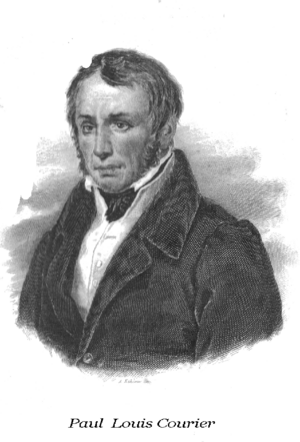Paul Louis Courier facts for kids
Paul Louis Courier (born January 4, 1772 – died April 10, 1825) was a French writer and scholar. He loved ancient Greek language and literature. Courier also became a well-known political writer. He often wrote about the problems faced by ordinary people in France.
Contents
Early Life and Education
Paul Louis Courier grew up on his father's estate in Touraine, France. He did not like the idea of being a nobleman, even though he could have used the name "de Méré." This was because he felt strongly against the nobility.
When he was about 15, he moved to Paris to continue his studies. His father had already taught him a lot about Greek literature. Even though he was good at math, he spent most of his free time studying classic books.
He later joined the school of artillery at Châlons. In September 1793, he became a sub-lieutenant and joined the army. He served in several wars, including campaigns in Italy and Germany. By 1803, he had become a chef d'escadron, which is a military rank.
Writing and Leaving the Army
Courier started writing in 1802. He wrote a review about a book on Greek literature. In 1803, he published Eloge d'Hélène, which was inspired by an ancient Greek text.
He left the army in 1808. However, he briefly joined a general's staff again. He was very upset by the violence he saw in a battle in 1809. After this, he decided that war was not an art.
He quickly left the army for good. Courier found it hard to follow orders and had left without permission a few times before. His leaders also did not like his sarcastic humor.
After leaving the army, he went to Florence, Italy. There, he found a complete old manuscript of a Greek story called Daphnis and Chloe. He published his own version of it in 1810. He had a disagreement with the librarian after accidentally damaging the manuscript. Because of this, he had to leave Tuscany. He then moved back to his estate in France. He often visited Paris and spent his time on writing and farming.
Political Writings
After the Bourbon kings returned to power in France, Courier began his career as a political writer. He had already helped people in his local area with their problems. Now, he became a strong voice against the government.
His first important political writing was Petition aux deux chambres (1816). In this, he wrote about the difficulties farmers faced under the new government. In 1817, he tried to join a famous French academy but did not succeed. He then wrote a sharp letter about it in 1819.
From 1819 to 1820, he wrote a series of powerful political letters for a newspaper. He supported a government where a king ruled but with more freedom for people. He likely hoped to see Louis Philippe as the leader.
In 1821, there was a plan to buy a large estate for a young duke. Courier wrote one of his best pieces about this, called Simple Discours de Paul Louis, vigneron de la Chavonnière. For this, he was put in prison for a short time and had to pay a fine. Before going to prison, he wrote about his trial, which became very popular.
He continued to write, publishing Livret de Paul Louis and Gazette de village in 1823. In 1824, he wrote his famous Pamphlet des pamphlets.
Later Life and Legacy
Courier also translated some ancient Greek texts. He translated Du commandement de la cavalerie et de l'equitation from Xenophon in 1807. He also helped edit a collection of Greek novels. He planned to translate Herodotus, another Greek historian, but he did not finish it.
On April 10, 1825, Paul Louis Courier was found shot in a forest near his home. The people who committed the crime were his own servants, but they were not found for five years. He is buried in Veretz cemetery. For many years, there were rumors that his death was a political murder.
Courier's writings are important because they tell us a lot about France before, during, and after the French Revolution. People say that his writing had "little subject matter and much art," meaning his style made his work valuable even when talking about everyday topics.
A collection of his political writings was published in 1826. There is a monument in Veretz that was put up 50 years after his death to honor him.
See also
 In Spanish: Paul-Louis Courier para niños
In Spanish: Paul-Louis Courier para niños
 | William Lucy |
 | Charles Hayes |
 | Cleveland Robinson |


